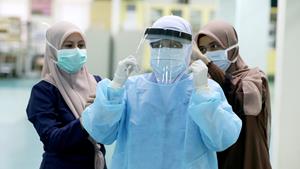September 8, 2020
Royal Philips today announced the results of its latest piece of Future Health Index (FHI) 2020 research. The Future Health Index Insights: COVID-19 and Younger Healthcare Professionals survey supplements the main FHI 2020 report, capturing feedback from 500 doctors under the age of 40 in five countries: the United States of America, China, Singapore, France and Germany.
Royal Philips reports the findings reveal how the COVID-19 pandemic has affected the attitudes and experiences of younger doctors, and how they believe the healthcare industry should change in response.
“Healthcare professionals, including the younger generation, have experienced unprecedented levels of stress and were often faced with limited resources in recent months. We must acknowledge the heroic sacrifices that frontline healthcare professionals have endured in the fight against COVID-19. We owe it to them to listen to their voices as we consider the future of the healthcare industry,” said Jan Kimpen, Chief Medical Officer, Royal Philips. “Our FHI Insights survey reveals that despite the challenges they’ve faced, younger doctors are as committed as ever to their vocation. The research spotlights how young doctors perceive change, and is relevant to leaders focused on reshaping how healthcare is being organized and delivered.”
Telehealth overtakes AI in the eyes of younger doctors
The COVID-19 pandemic has prompted younger doctors to change their attitudes to the relative benefits of different health technologies. It has led to a shift in priorities, with younger doctors recognizing the immediate value of telehealth. Before the pandemic, 60% of younger healthcare professionals ranked AI as the top digital health technology that would most improve their work satisfaction, with 39% identifying telehealth as the top technology. 61% of younger doctors now rank telehealth as the digital health technology that would have most improved their experiences at this time, with AI falling to 53%.
Younger doctors surveyed believed that there is room for improvement in how these technologies are used in everyday practice. When asked what would have helped them leverage the health data available to them during the height of the pandemic, nearly half (47%) of younger doctors pointed to better integration of healthcare data between hospitals/practices and between different IT systems or electronic medical records.
Younger doctors want more digital technology
For many younger doctors, working through COVID-19 has shown what a more technologically forward-thinking workplace could look like, with 44% reporting the pandemic exposed them to new ways of using digital health technologies.
As the healthcare sector prepares for the future, many younger doctors hope these advancements will become permanent fixtures of their post-COVID-19 workplace environments. When asked what changes in healthcare they most hoped would become outlast the pandemic, younger doctors ranked exposure to new types of digital health technologies (29%), new ways to use digital health technologies (29%), greater appreciation from patients (29%), and accelerated availability of digital health technologies (28%) as their top responses.
Many younger doctors are more committed than ever to their careers
The pandemic is presenting healthcare professionals with even greater workplace hardships and moral dilemmas, which are very likely to exacerbate existing levels of burnout and related mental health problems [1]. However, according to the FHI 2020 Insights survey, many younger doctors (38%) say they are more likely to stay in medicine as a result of their experiences working during COVID-19. Most (53%) said COVID-19 had no effect on them wanting to stay in or leave the profession, and only 9% said they were more likely to leave the profession.
Many younger doctors also reported changes in their day-to-day work during the pandemic, which could lead to increased career and personal satisfaction. 47% reported greater appreciation from patients, while 44% experienced greater collaboration with colleagues across different skill sets. Younger doctors in China stood out by reporting a deeper feeling of purpose at work (70%) since the onset of COVID-19.
Since 2016, Philips has conducted original research to help determine the readiness of countries to address global health challenges and build efficient and effective healthcare systems. For details on the Future Health Index methodology and to access the 2020 report in its entirety, including the FHI Insights: COVID-19 and Young Healthcare Professionals research, visit the Future Health Index site.
[1] National Academy of Medicine: https://nam.edu/initiatives/clinician-resilience-and-well-being/clinician-well-being-resources-during-covid-19/



